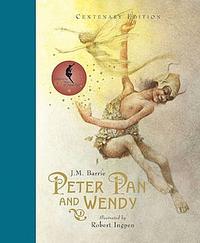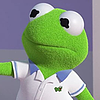Take a photo of a barcode or cover
adventurous
funny
lighthearted
medium-paced
Plot or Character Driven:
A mix
Strong character development:
Complicated
Loveable characters:
Complicated
Diverse cast of characters:
No
Flaws of characters a main focus:
Complicated
After I read the Peter and the Starcatcher series (review to come), I knew I had to go back and read the original story. I really only know the Peter Pan story from the Disney cartoon, and various other movie renditions I have seen. I love the Disney film, and most of the other movies too to be honest. The story is fairly true to the Disney movie, with much of the violence removed. I did like the story, however, I didn’t really love the writing style. The language was no in keeping with modern times, because the book is so old, so I didn’t really enjoy it. I did not like the narrative interjections at all, and it felt too much like reading a play, which I guess I’m not into, even though I really do enjoy watching plays. I guess this is why I don’t really read classic novels.
I didn’t expect much going into this book, but I was delightfully surprised. This books really captures the lightheartedness of being a child and is surprisingly sad. I would definitely reread this.
I actually really loved this. Which was surprising. It may be my favorite children's classic. There was so much magic and adventure and I was kind of blown away by everything that happened. For a classic, it really wasn't overly confusing or precocious, which I hate in classics, because it just feels like the author is trying to one-up you, and it's also very confusing, but I can't judge too much because that was back then and this is now. But I thought J.M. Barrie wrote it in a simple way, with some embellishes that were very clear. It wasn't anything too special, but it had a charm to it, sort of like country boy turned city boy. That probably made no sense, but it did to me. That actually made the story much more enjoyable, because I was kind of expecting that sort of mind-boggling, pretentious writing style, but I didn't get that at all, which really surprised me.
The plot was interesting, but weird. I thought it was amazing, and although it took me awhile to read it, I was only reading bit by bit so... However, the story line did feel unrealistic, not because of the magic, or other world part, but because Peter Pan and the Lost Boys just did so many things that moved the plot along that didn't seem possible to be done by such young boys. They were killing people and they were proud of it. I don't know what morals people had back in the 1900's, but I'm pretty sure young boys don't kill like 5 people in an hour and be totally happy and not scarred from it. Just thinking about it makes me shiver, and the book didn't even describe it in a gruesome way. Other than that, I was pretty absorbed in this book, and it was really interesting, and I've run out of adjectives.
The world was strange. As I read more and more children's classics, I've grown more convinced that half of them are drunk or high while writing, because I don't know how they came up with such weird, weird things. Boys who never grow up, pirates, and Indians (Native Americans). Please tell me how all these things correlate and how J.M. Barrie all put them together because I don't know. But it was different, and although not new to many, new to me, so I thought it was a good book to read as a break from what I normally read.
The one thing I really could not stand (I'm sitting right now haha) were the gender and ethnic roles. Wendy was just too much of a girl/woman, and she was just the 'perfect lady' and all the guys were manly and macho. Of course, this was written over a century ago, so I have to pardon it (mostly) but it still irked me. And the Native Americans. Now, I mostly don't mind Native Americans being called Indians, because it's pretty much just a second name for them. They might mind, but I can't do anything about it. But they were described as people who weren't as developed and critical as the white people, and that is not true at all. Native Americans actually had some ingenious ways of solving problems, and although they had different lives than we did, that doesn't mean that they are somehow lesser. Once again, different time periods, but it's all kind of the same to me.
It was still a really fun and enjoyable read, and I really liked the characters, the plot, the world, the writing. It worked really well for me. I will definitely be rereading this in the future!
The plot was interesting, but weird. I thought it was amazing, and although it took me awhile to read it, I was only reading bit by bit so... However, the story line did feel unrealistic, not because of the magic, or other world part, but because Peter Pan and the Lost Boys just did so many things that moved the plot along that didn't seem possible to be done by such young boys. They were killing people and they were proud of it. I don't know what morals people had back in the 1900's, but I'm pretty sure young boys don't kill like 5 people in an hour and be totally happy and not scarred from it. Just thinking about it makes me shiver, and the book didn't even describe it in a gruesome way. Other than that, I was pretty absorbed in this book, and it was really interesting, and I've run out of adjectives.
The world was strange. As I read more and more children's classics, I've grown more convinced that half of them are drunk or high while writing, because I don't know how they came up with such weird, weird things. Boys who never grow up, pirates, and Indians (Native Americans). Please tell me how all these things correlate and how J.M. Barrie all put them together because I don't know. But it was different, and although not new to many, new to me, so I thought it was a good book to read as a break from what I normally read.
The one thing I really could not stand (I'm sitting right now haha) were the gender and ethnic roles. Wendy was just too much of a girl/woman, and she was just the 'perfect lady' and all the guys were manly and macho. Of course, this was written over a century ago, so I have to pardon it (mostly) but it still irked me. And the Native Americans. Now, I mostly don't mind Native Americans being called Indians, because it's pretty much just a second name for them. They might mind, but I can't do anything about it. But they were described as people who weren't as developed and critical as the white people, and that is not true at all. Native Americans actually had some ingenious ways of solving problems, and although they had different lives than we did, that doesn't mean that they are somehow lesser. Once again, different time periods, but it's all kind of the same to me.
It was still a really fun and enjoyable read, and I really liked the characters, the plot, the world, the writing. It worked really well for me. I will definitely be rereading this in the future!
I can't review this book.
I've opened and closed this webpage so many times trying to gather my thoughts, that I'm pretty sure they're never going to get gathered. I can't believe I liked it as much as I did. I started off hating it and now I love it.
All I have to say is this: If you think the movie was great, just read the book. It's completely different, but better. The book won't make you look at the boy that never grows up the same as you saw him in the movie. This is both good and bad, but it isn't J.M. Barrie's fault, it's more Disney's fault. Curse you, Disney movies! I'm just kidding. I love Disney movies, so no matter how much they distort reality, I'll always love them.
To read this book you must always remember that books and movies exist in two different dimensions (metaphorically, of course). Don't expect to see the movie and think that you already read the book. You didn't. Don't read the book and then expect the movie to be exactly the same, because it won't. Just... do both. You won't be dissapointed. Trust me.
My favorite quote is taken from this book, and I never knew it before I read it.
I've opened and closed this webpage so many times trying to gather my thoughts, that I'm pretty sure they're never going to get gathered. I can't believe I liked it as much as I did. I started off hating it and now I love it.
All I have to say is this: If you think the movie was great, just read the book. It's completely different, but better. The book won't make you look at the boy that never grows up the same as you saw him in the movie. This is both good and bad, but it isn't J.M. Barrie's fault, it's more Disney's fault.
To read this book you must always remember that books and movies exist in two different dimensions (metaphorically, of course). Don't expect to see the movie and think that you already read the book. You didn't. Don't read the book and then expect the movie to be exactly the same, because it won't. Just... do both. You won't be dissapointed. Trust me.
My favorite quote is taken from this book, and I never knew it before I read it.
“You know that place between sleep and awake, the place where you can still remember dreaming? That’s where I’ll always love you. That’s where I’ll be waiting.”
sigh.. couldn't stand the characters and the writing
adventurous
lighthearted
medium-paced
Plot or Character Driven:
Plot
Strong character development:
Complicated
Loveable characters:
Complicated
Diverse cast of characters:
No
Flaws of characters a main focus:
Yes
TL;DR:
Peter Pan was more emotionally complex, darker, and more violent than I expected for a children’s book. The whimsical writing and deeper themes about childhood, loss of innocence, and maternal love were compelling—but the racist, stereotypical portrayal of Indigenous people was deeply offensive. I’m glad I read it for context, but I wouldn’t revisit it.~
✨️🌌⏳️🏝☠️🧚♂️✨️
As someone who grew up with Disney’s Peter Pan, I was curious to finally read J.M. Barrie’s original novel and see how it held up—and how it compared to the adaptation that shaped so many childhood memories. I expected something whimsical and light, but what I found was more layered, more melancholic, and, in some ways, more troubling than I anticipated.
*THEMES*
At its heart, Peter Pan is a story about childhood, but not in the carefree, playful sense we often associate with the word. It’s more about the desperate clinging to youth—how frightening growing up can be, and how comforting it is to be taken care of. The theme of motherhood runs throughout the book, presented as both a source of safety and a site of emotional trauma. Peter himself is emotionally wounded by his belief that his own mother closed the window on him and forgot him when he flew away. It’s a surprisingly painful undercurrent for a children’s classic.
*WRITING STYLE*
The narration was another surprise: it’s playful and self-aware in a way that feels unusually modern. Barrie writes with a kind of wink to the reader, reminding us that we’re hearing a story and that he’s the one shaping it. The tone is whimsical and stylized, with lines that stood out for their cleverness and symbolic weight—like the quote about Captain Hook:
Peter Pan was more emotionally complex, darker, and more violent than I expected for a children’s book. The whimsical writing and deeper themes about childhood, loss of innocence, and maternal love were compelling—but the racist, stereotypical portrayal of Indigenous people was deeply offensive. I’m glad I read it for context, but I wouldn’t revisit it.~
✨️🌌⏳️🏝☠️🧚♂️✨️
As someone who grew up with Disney’s Peter Pan, I was curious to finally read J.M. Barrie’s original novel and see how it held up—and how it compared to the adaptation that shaped so many childhood memories. I expected something whimsical and light, but what I found was more layered, more melancholic, and, in some ways, more troubling than I anticipated.
*THEMES*
At its heart, Peter Pan is a story about childhood, but not in the carefree, playful sense we often associate with the word. It’s more about the desperate clinging to youth—how frightening growing up can be, and how comforting it is to be taken care of. The theme of motherhood runs throughout the book, presented as both a source of safety and a site of emotional trauma. Peter himself is emotionally wounded by his belief that his own mother closed the window on him and forgot him when he flew away. It’s a surprisingly painful undercurrent for a children’s classic.
*WRITING STYLE*
The narration was another surprise: it’s playful and self-aware in a way that feels unusually modern. Barrie writes with a kind of wink to the reader, reminding us that we’re hearing a story and that he’s the one shaping it. The tone is whimsical and stylized, with lines that stood out for their cleverness and symbolic weight—like the quote about Captain Hook:
“He was never more sinister than when he was most polite.”
That line alone captures so much of the book’s dual nature: the way childlike fantasy is blended with real danger and darkness.
*ADAPTATION COMPARISON*
The Disney film, interestingly enough, stays fairly close to the book in spirit and character. Peter is still cocky and bratty, Hook is theatrical and menacing, and Wendy plays the nurturing, grown-up child among the Lost Boys. The adaptation rearranges and condenses the plot, but the core personalities are remarkably consistent. What Disney tones down, though, is the violence. In Peter Pan, the play-fighting of Neverland has consequences—people die. That darkness, while not graphic, caught me off guard. I didn't expect quite so much death.
*SETTING*
As for the setting, both London and Neverland are vividly drawn. London feels cozy and nostalgic, while Neverland is magical and dreamlike, full of the kind of make-believe that only children can fully immerse themselves in. It works beautifully with the themes of imagination, freedom, and escape.
🚫⚠️But then there’s the part that didn’t work—and honestly, shouldn’t have even then: the depiction of Indigenous people. The use of the term “Redskins,” the cultural stereotypes, the appropriation of Native customs by the white characters—these aspects are offensive and unacceptable. They age very poorly, and it’s hard to justify or excuse them, even in historical context. That part of the book was uncomfortable to read and significantly detracts from its legacy.
*FINAL THOUGHTS*
It’s not a book I’d re-read, but I’m glad I finally experienced it. It’s whimsical and clever, but also darker and more emotionally complex than I expected. While some parts still sparkle with imagination, others feel painful and outdated. I appreciate it for its historical value and what it has to say about childhood—but I won’t pretend it doesn’t come with caveats.
*ADAPTATION COMPARISON*
The Disney film, interestingly enough, stays fairly close to the book in spirit and character. Peter is still cocky and bratty, Hook is theatrical and menacing, and Wendy plays the nurturing, grown-up child among the Lost Boys. The adaptation rearranges and condenses the plot, but the core personalities are remarkably consistent. What Disney tones down, though, is the violence. In Peter Pan, the play-fighting of Neverland has consequences—people die. That darkness, while not graphic, caught me off guard. I didn't expect quite so much death.
*SETTING*
As for the setting, both London and Neverland are vividly drawn. London feels cozy and nostalgic, while Neverland is magical and dreamlike, full of the kind of make-believe that only children can fully immerse themselves in. It works beautifully with the themes of imagination, freedom, and escape.
🚫⚠️But then there’s the part that didn’t work—and honestly, shouldn’t have even then: the depiction of Indigenous people. The use of the term “Redskins,” the cultural stereotypes, the appropriation of Native customs by the white characters—these aspects are offensive and unacceptable. They age very poorly, and it’s hard to justify or excuse them, even in historical context. That part of the book was uncomfortable to read and significantly detracts from its legacy.
*FINAL THOUGHTS*
It’s not a book I’d re-read, but I’m glad I finally experienced it. It’s whimsical and clever, but also darker and more emotionally complex than I expected. While some parts still sparkle with imagination, others feel painful and outdated. I appreciate it for its historical value and what it has to say about childhood—but I won’t pretend it doesn’t come with caveats.
Graphic: Racial slurs, Cultural appropriation
Moderate: Bullying, Child abuse, Death, Misogyny, Racism, Sexism, Violence, Blood, Murder, Injury/Injury detail
Minor: Death of parent, Abandonment
"Breakfast means breakfast!"
I listened to the Audible dramatisation of the book and you can tell the cast had a good time recording it, the way it should be when telling a story about a gang of children. The voices were silly and the sound effects really brought it to life.
There's not much new that this edition brings to the famous story but it was a nice listen nonetheless.
I listened to the Audible dramatisation of the book and you can tell the cast had a good time recording it, the way it should be when telling a story about a gang of children. The voices were silly and the sound effects really brought it to life.
There's not much new that this edition brings to the famous story but it was a nice listen nonetheless.
Such a beautiful and heartbreaking story. Brings back childhood memories, but now I discover so many hidden meanings and themes






